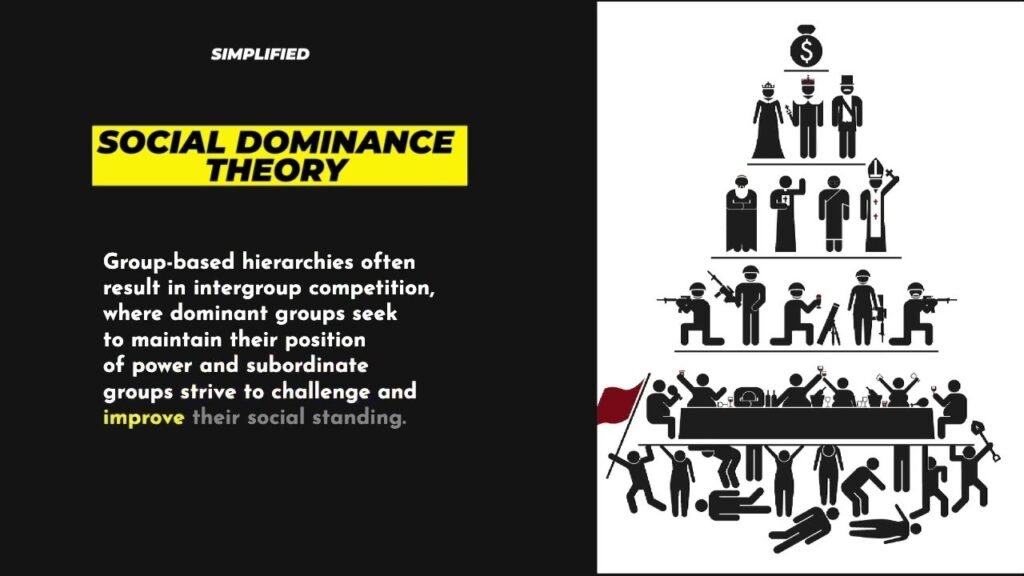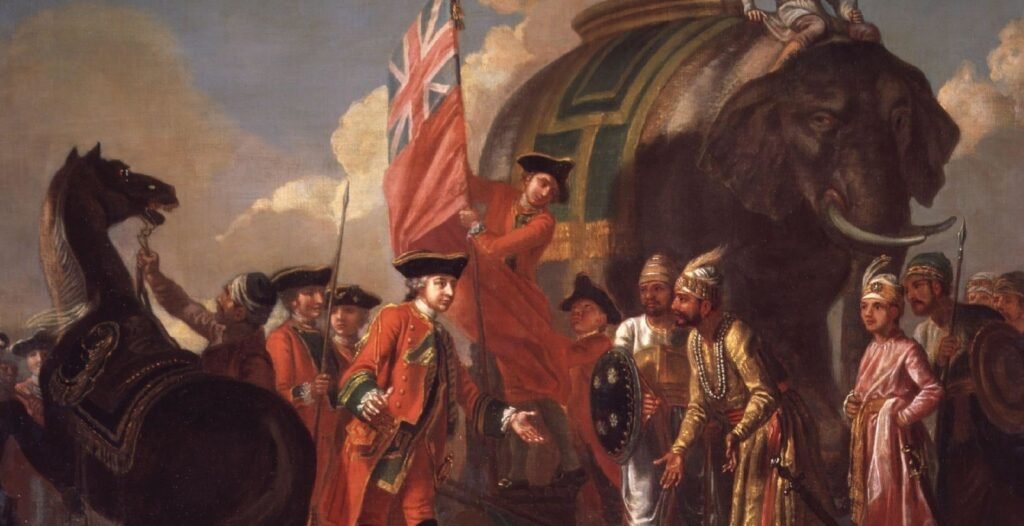Why can’t there be world peace? Because every great nation wants to be on top. That means China, Russia, and the USA are battling to be the number one nation on earth. Why?

Because biology has built something strange into us: the pecking order, the social totem pole, the ladder of status, what scientists call the “dominance hierarchy.” And the dominance hierarchy is built into our biology. How do we know that?
On the evolutionary timeline, we parted from lobsters, lizards and birds as long as six hundred million years ago. But lobsters, lizards, and birds have dominance hierarchies. Which hints that we all may have inherited dominance hierarchies from a common ancestor.
Or, to put it differently, dominance hierarchies were written into our genes at least six hundred million years ago. Which means that the battle for a position at the top has been with us for half a billion years.

This is not just a battle between individuals. It’s often a battle between groups. A battle between groups to fight their way to the top and to lord it over other groups.
But there’s a positive side to all this fighting. Lobsters, lizards, and birds experience long periods of peace. When? When the competition for dominance is over and there’s a clear top lobster, top lizard, or top chicken.
But toss someone new into barnyard, and the peace disappears. All heck breaks loose.

The same thing happens among us human beings.
The Romans clawed their way up the ladder of nations for eight centuries. They loved war and they celebrated brutality. But when they finally established their dominance over all of Europe’s other tribes, they were able to initiate a peace that lasted over 200 years.
Ironically, the Romans established that peace by making war. And winning. Those 200 years of peace were called The Pax Romana, the Roman Peace. But the Romans were not the only ones to establish a long-term peace by making war.

England invented the steam engine in 1712, used it to double the size of its economy, bulked up its navy, ended the Napoleonic wars by defeating France at the Battle of Waterloo in 1815, and established a long-term peace, a peace that was marred by small wars, but a peace that lasted 99 years. The Pax Britannica.
The British pulled this off by ruling the roost. By becoming the top chicken in the barnyard.
Then another nation got rich and powerful by developing two industries even newer than the steam engine: the electrical industry and the chemical industry. German power-generating dynamos, German electrical lighting, brightly colored German chemical dyes, aspirin, antiseptics, industrially-made fertilizer, and explosives were so wildly popular that they made the economy of this upstart nation strong.

Strong enough to challenge England for the top position in the pecking order. Strong enough to lunge for the position as ruler of the barnyard. As ruler of the dominance hierarchy. That tussle led to World War One. The upstart nation challenging England and shattering the Pax Britannica was Germany.
When two world wars were over, England, Germany, and France were drained and weakened. So another newcomer took over the top position in the pecking order of nations—the United States.
The result is that with America as the top chicken in the farmyard and America as the policeman of the world, the people of this planet have avoided world wars for 80 years. We have had a Pax Americana.

But we are giving up our position as the world’s policeman while our president aims for yet another role: the role of the great peacemaker. Will this allow us to extend the Pax Americana? With surprise shows of might like the bunker buster bombing of Iran’s nuclear facility at Fordow on June 22nd, the answer may be yes. But we shall have to see.
References:
Howard Bloom. The Lucifer Principle: a scientific expedition into the forces of history. New York: Atlantic Monthly Press, 1995.
Kooij, M., & Sandi, C. (2015). The genetics of social hierarchies. Current Opinion in Behavioral Sciences, 2, 52-57. https://doi.org/10.1016/j.cobeha.2014.09.001.
Schjelderup-Ebbe, T. (1922). Beiträge zur Sozialpsychologie des Haushuhns [Contributions to the Social Psychology of the Domestic Hen]. Zeitschrift für Psychologie, 88, 225–252.
Paul Kennedy. The Rise and Fall of the Great Powers:
Economic Change and Military Conflict from 1500 to 2000.
New York: Random House, 1987.
Jeremy Armstrong, War and Society in Early Rome: From Warlords to Generals. Cambridge: Cambridge University Press, 2016. xiv, 317. ISBN 9781107093577.
Adrian Goldsworthy (2016), Pax Romana: War, Peace, and Conquest in the Roman World, Yale University Press, ISBN: 9780300178821
Roman army – bloody, brutal, vengeful…
| Roman army – bloody, brutal, vengeful…Jakub JasińskiWhile we marvel at Rome’s achievements – architecture, mosaics, frescoes, literature and law – the truth is pain… |
Neil Greenberg (2003) Sociality, Stress, and the Corpus Striatum of the Green Anolis Lizard. PHYSIOLOGY & BEHAVIOR Volume 79. issue 3 pp 429-440.
Sbragaglia, V., Leiva, D., Arias, A., García, J. A., Aguzzi, J., & Breithaupt, T. (2017). “Fighting over burrows: the emergence of dominance hierarchies in the Norway lobster (Nephrops norvegicus).”
Journal of Experimental Biology, 220(24), 4624–4633.
Ian Clark (2011), “Singular Hegemony: Pax Britannica 1815–1914,” in Hegemony in International Society, Oxford University Press.
Crafts, Nicholas (2004), “Steam as a General Purpose Technology: A Growth Accounting Perspective.” The Economic Journal, 114(April), 338–351. Published by the Royal Economic Society.
N. A. M. Rodger (2008), “Recent Work in British Naval History, 1750–1815,” The Historical Journal, Volume 51, Issue 3, pp. 741–751, Published by Cambridge University Press.
G. John Ikenberry, Liberal Leviathan: The Origins, Crisis, and Transformation of the American World Order, Princeton University Press, 2011, ISBN: 9780691156170, DOI: 10.1515/9781400838196
______
About the author: Howard Bloom of the Howard Bloom Institute has been called the Einstein, Newton, Darwin, and Freud of the 21st century by Britain’s Channel 4 TV. Bloom’s new book is The Case of the Sexual Cosmos: Everything You Know About Nature is Wrong. Says Harvard’s Ellen Langer of The Case of the Sexual Cosmos, Bloom “argues that we are not savaging the earth as some would have it, but instead are growing the cosmos. A fascinating read.” One of Bloom’s eight previous books–Global Brain—was the subject of a symposium thrown by the Office of the Secretary of Defense including representatives from the State Department, the Energy Department, DARPA, IBM, and MIT. Bloom’s work has been published in The Washington Post, The Wall Street Journal, Wired, Psychology Today, and the Scientific American. Not to mention in scientific journals like Biosystems, New Ideas in Psychology, and PhysicaPlus. Says Joseph Chilton Pearce, author of Evolution’s End and The Crack in the Cosmic Egg, “I have finished Howard Bloom’s [first two] books, The Lucifer Principle and Global Brain, in that order, and am seriously awed, near overwhelmed by the magnitude of what he has done. I never expected to see, in any form, from any sector, such an accomplishment. I doubt there is a stronger intellect than Bloom’s on the planet.” For more, see http://howardbloom.net or http://howardbloom.institute

